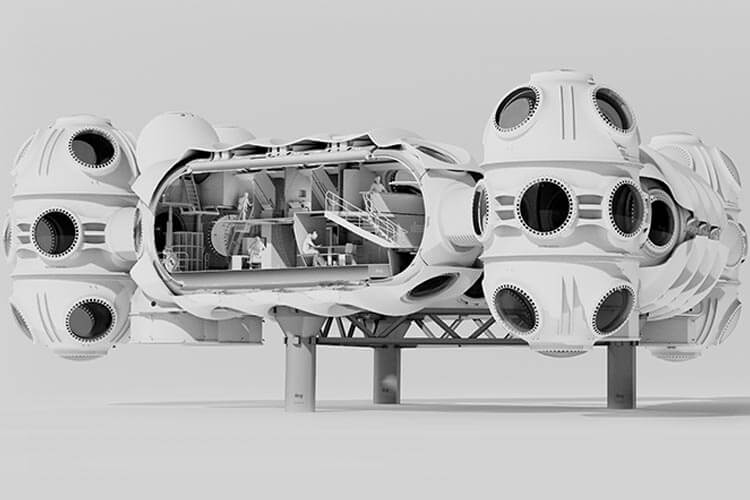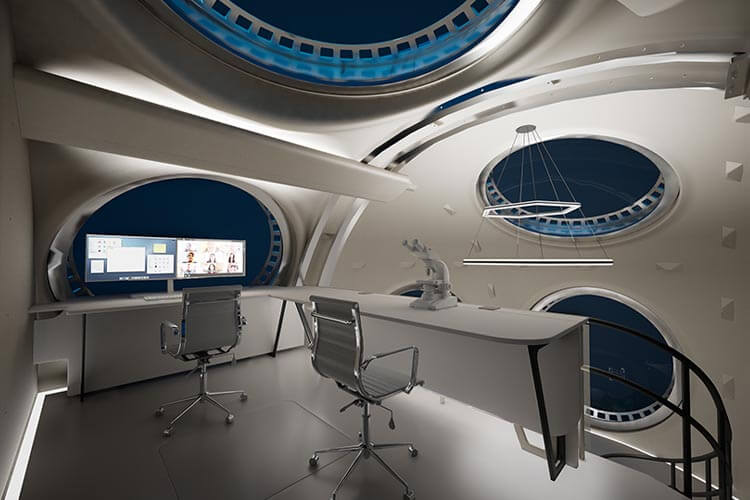
DEEP Sentinel underwater habitat system will bring humans a permanent base underwater by 2027
A new deep-sea habitat project has been launched by ocean technology and exploration company, DEEP, which has announced its intention to create a permanent human presence under the oceans by 2027.
The project is already two years in development, with its base located at the former British National Diving and Activity Centre (NDAC), an 80m-deep, 600m-long flooded quarry in Gloucester, England, which suddenly announced its closure in February 2022.
The site, close to the border between England and Wales in the southwest of Great Britain, was chosen for its topography, clear water, and proximity to a number of companies with marine engineering, diving, hyperbaric and submersible expertise, with links with the wider UK commercial and technical diving industry.
Related articles


The centrepiece of DEEP’s project is Sentinel, a customisable capsule system designed to be ‘modular, scalable, autonomous, recoverable, re-configurable and re-deployable.’ Sentinel can be tailored to the individual needs of its users, be that a single installation or a network of segments interlinked to form a ‘deep-sea village’, and DEEP claims it will be installed on the sea floor with minimum disturbance to the surrounding ecosystem.
Built using an innovative construction method employing robotic welding arms, which will deposit high grade steel using wire arc additive manufacturing – essentially a form of 3D-printing but with metal – the Sentinel system will be extremely resilient to pressure, and will be built with several degrees of redundancy in case of failure.
The modules will be deployable at depths of up to 200m, which will allow it to be explored on much of the global continental shelves, with its residents having unfettered access to the epipelagic, or ‘sunlight’, zone of the ocean, where it is estimated that 90 per cent of all ocean life resides.
The pods will be constructed to be comfortable living spaces as well as scientific research stations. Each of the modules 6m in diameter, approximately the same width as the fuselage of a Boeing 777, and capable of catering to a crew of 6.
As living on the station involves full-saturation diving, crewmembers will rotate on a 28-day cycle, with around 20 spent onboard, depending on the depth and decompression profile of the deployment.


DEEP says the habitats will be serviced by a new generation of submersibles, standardised in construction to cater to the scientists, explorers and tourists to whom the company intends to offer its services – which the company will call its ‘Aquans’.
Sentinel and the new submersibles will be supported by training and qualification programmes hosted by the DEEP Institute, and an underwater research & development and testing facility at the DEEP Campus in Gloucestershire. The company has also purchased a nearby pub to host campus attendees.
The philosophy underpinnning the ambitious new project is to allow exploratory access to the sea floor in the same way that a human scientist might research a terrestrial environment.
Rather than drop in and out for a few moments at a time, people will be able to live at depth and continuously monitor the environment in ways that autonomous drones cannot.
Although there is no information currently available about its sources of funding, DEEP says it is already talking to potential international partners, ‘and others with a long-term view of the needs of the planet, who recognise that the up-side for humanity in preserving and husbanding the oceans is now too great to ignore.’


The company says that it is targeting ‘the emerging ocean/blue economy’, with ‘opportunity and solutions in pharmaceutical research, carbon capture, [and] innovative medicines.’
‘We need to preserve the oceans. To do that we need to understand them,’ said Steve Etherton, President, EMEA of DEEP. ‘The oceans sit at the centre of many of the generational challenges the world is facing, and they also offer opportunities we have not even begun to comprehend. They are the source of at least every other breath we take.
‘They influence the weather. They influence the climate. They influence us. Yet, this life-sustaining ecosystem remains surprisingly unknown. Through our innovative technology, DEEP will enable scientists to operate at depth for extended periods of time and we hope, in some small way, will contribute to our understanding of this life-giving environment.’
For more information, visit www.deep.com
- New shark-repellent hook could cut longline bycatch by more than 60 per cent - 17 February 2026
- Perth dive operator fined after leaving divers behind - 16 February 2026
- Aggressor Adventures announces upgraded Red Sea Aggressor IV - 13 February 2026


